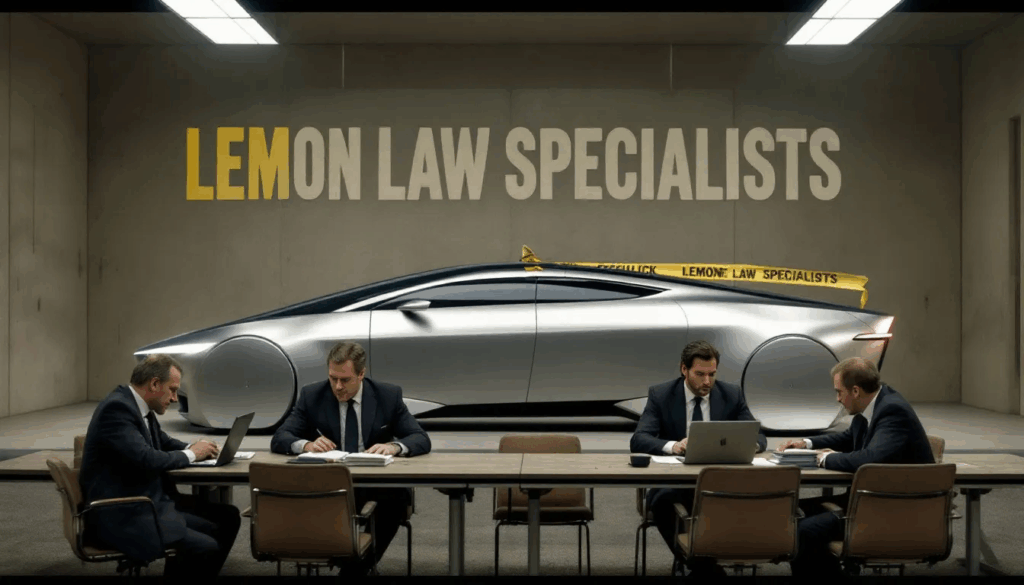
How California’s Lemon Law Applies to the Tesla Cybertruck
California’s lemon law is designed to protect consumers who purchase defective vehicles, including electric vehicles like the Tesla Cybertruck. Under this law, if a Cybertruck has a substantial defect that significantly impairs its use, value, or safety and the manufacturer is unable to repair the issue after a reasonable number of attempts, the vehicle may qualify as a “lemon.”
This means the owner could be entitled to a replacement vehicle, a refund, a new vehicle, or cash compensation.
The law applies to new and used Cybertrucks still covered under the manufacturer’s warranty. If your Tesla Cybertruck has a defect that substantially affects its use, value, or safety, and neither the manufacturer nor an authorized dealer can resolve the issue after a reasonable number of repair attempts, your vehicle may qualify as a lemon.
Most Common Problems With 2024 Tesla Cybertruck
This particular Tesla model, despite its innovative design and advanced electric truck features, has faced a range of issues reported by owners and highlighted in various recalls. Many Cybertruck owners have reported recurring defects that significantly affect the vehicle’s performance, safety, and value, prompting concerns and legal actions under the Cybertruck lemon law.
Understanding these common problems can help current and prospective owners identify potential issues early and know their rights under California’s lemon law.
Battery and Charging Issues
Several Tesla Cybertruck models have experienced battery malfunctions and charging system failures, leading to recalls by Tesla. Source: National Highway Traffic Safety Administration (NHTSA) Recall Database
Suspension Problems
Reports of suspension system defects causing uneven ride height and handling difficulties have been submitted by Cybertruck owners. Source: Tesla Service Bulletins
Software Glitches
Many Cybertruck owners reported that frequent software updates have sometimes introduced bugs affecting vehicle controls, autopilot functionality, and infotainment systems. Source: Tesla Owner Forums
Door and Window Malfunctions
Tesla owners have reported issues with the Cybertruck’s unique door mechanisms and power windows failing to operate correctly.
Structural and Body Defects
Some Tesla vehicles have had issues with body panel misalignments and frame issues impacting the vehicle’s safety and aesthetics. Source: Consumer Reports
Charging Port Defects
Problems with the charging port door not opening or closing properly have been noted in multiple complaints. Source: NHTSA Complaints
Autopilot and Self-Driving Features
Several Tesla Cybertruck owners have reported issues with the autopilot and self-driving features, including unexpected disengagements and inconsistent performance, raising safety concerns. Source: Tesla Owner Forums
Autopilot and Self-Driving Features
Several Tesla Cybertruck owners have reported issues with the autopilot and self-driving features, including unexpected disengagements and inconsistent performance, raising safety concerns. Source: Tesla Owner Forums
Cybertruck Accelerator Pedal Problems
Some Tesla Cybertruck owners have reported issues with the accelerator pedal, including unresponsive or sticking pedals that can cause unintended acceleration or difficulty in controlling the vehicle’s speed. These problems pose significant safety risks and have led to complaints and investigations. Source: National Highway Traffic Safety Administration (NHTSA) Complaints
Cybertruck Rust Problems
Despite the Cybertruck’s stainless steel exoskeleton, some owners have reported concerns related to rust and corrosion, particularly around certain components and areas not covered by the stainless steel panels. These rust issues can affect parts such as the undercarriage, suspension components, and fasteners, which may be made from different materials susceptible to corrosion. Rust problems can lead to safety concerns, decreased vehicle value, and potential mechanical failures if left unaddressed. Source: Tesla Cybertruck Owner Club
Recent Cybertruck Recalls: How They Relate To Lemon Law Claims
While Tesla’s recalls are intended to fix known defects, the existence of a recall alone does not automatically qualify a Cybertruck as a lemon. If your vehicle continues to experience the same substantial defects covered by these recalls despite multiple repair attempts, this persistent problem likely meets the criteria for a lemon law claim though.
Consulting with experienced lemon law attorneys, like our team here at Lemon Law Associates of California, can help determine if your Cybertruck’s problems, especially those linked to recall defects, qualify you for compensation or a replacement vehicle under the law.
How To Resolve Your Cybertruck Lemon
There are clear steps you can take to protect your rights and seek compensation for your defective Cybertruck vehicle. Addressing the issue promptly and methodically increases your chances of a successful resolution under our state’s lemon law.
Below is a structured guide outlining the essential steps to fix your Cybertruck lemon situation:
1) Document Everything
The first and most crucial step is to keep detailed records of every issue you encounter with your own vehicle. This includes dates, descriptions of the defects, repair attempts, invoices, and all communication with Tesla or authorized dealers. Thorough documentation is vital evidence when filing a lemon law claim and helps demonstrate the recurring nature of the problem.
2) Give Tesla a Chance to Fix the Problem
California’s lemon law requires that the manufacturer be given a reasonable number of attempts to repair the substantial defect. Make sure to allow Tesla or its authorized service centers sufficient opportunities to address the issues. Keep track of each repair attempt and whether the problem persists after these efforts.
3) Consult a Lemon Law Attorney
If the defects continue despite repair attempts, consulting an experienced lemon law attorney is a wise next step. An attorney can evaluate your case, help you understand your rights, and guide you through the complex legal process. They can also negotiate with Tesla on your behalf to seek a favorable outcome.
4) File a Lemon Law Claim and Seek Compensation
When all other options have been exhausted, you may proceed to file a lemon law claim. This legal action can result in a replacement vehicle, a refund, or cash compensation for your troubles. With the support of a lemon law attorney, you can navigate the claim process effectively and work toward a resolution that protects your investment and peace of mind.
Eligibility Under California’s Lemon Law

The law is designed to protect consumers who have purchased defective vehicles, including those who encounter difficulties when trying to sell or trade in their trucks.
To qualify for a lemon law claim, a Cybertruck must have a substantial defect that seriously affects its use, value, or safety. This defect should persist despite a reasonable number of repair attempts, with the manufacturer given ample opportunity to fix the problem.
California’s lemon law covers vehicles still under the manufacturer’s warranty, including both new and used Cybertrucks. Owners who face recurring issues may be eligible for a refund, a replacement vehicle, or cash compensation.
Find Out If Your Cybertruck Qualifies as a Lemon

Our experienced attorneys specialize in California’s lemon law and are here to help you determine if your Tesla Cybertruck qualifies as a lemon. With deep knowledge of the complexities surrounding lemon law claims and Tesla vehicles, we provide personalized guidance to evaluate your situation thoroughly.
Whether you’re struggling with recurring defects, repair delays, or safety concerns, our team will fight to secure the best possible outcome.
And whether that means a replacement vehicle, cash compensation, or a full refund, we’re here to fight for you every step of the way. Don’t let ongoing issues with your Cybertruck drain your time and patience; reach out today for a free consultation and let our skilled lemon law attorneys protect your investment and peace of mind.











